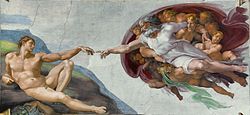Special creation: Difference between revisions
Mthoodhood (talk | contribs) logic change |
Mthoodhood (talk | contribs) There is already an article on the topic of creation of each human soul -- Creationism (soul) |
||
| Line 5: | Line 5: | ||
}} |
}} |
||
{{creationism2}} |
{{creationism2}} |
||
In [[Creationism]], '''special creation''' is a theological doctrine which states that the universe and all life in it originated by unconditional fiat or divine decree. [[Roman Catholicism]] uses the phrase in a different sense: to refer to the doctrine of immediate or special creation of each human soul. |
In [[Creationism]], '''special creation''' is a theological doctrine which states that the universe and all life in it originated by unconditional fiat or divine decree. |
||
[[Roman Catholicism]] uses the phrase in a different sense: to refer to the doctrine of immediate or [[Creationism (soul)|special creation of each human soul]]. |
|||
==Creationism== |
==Creationism== |
||
Revision as of 06:36, 27 August 2011
This article has multiple issues. Please help improve it or discuss these issues on the talk page. (Learn how and when to remove these messages)
No issues specified. Please specify issues, or remove this template. |
| Part of a series on | ||||
| Creationism | ||||
|---|---|---|---|---|
 | ||||
| History | ||||
| Types | ||||
| Biblical cosmology | ||||
| Creation science | ||||
| Rejection of evolution by religious groups | ||||
| Religious views | ||||
|
||||
In Creationism, special creation is a theological doctrine which states that the universe and all life in it originated by unconditional fiat or divine decree.
Roman Catholicism uses the phrase in a different sense: to refer to the doctrine of immediate or special creation of each human soul.
Creationism
In the creationist use of the phrase, special creation adheres to a literal interpretation of the account of creation in the Book of Genesis, accepting it as an accurate historical account of the creation of the universe in essentially its present form over the course of six 24-hour days. Special creation was the dominant theory of life's origins in the western world from the 16th century until the middle of the 19th century when it was supplanted by evolutionary thought.[1][2]
Duane Gish of the Institute for Creation Research defined "special creation" as being creation using supernatural processes:
We do not know how the Creator created, [or] what processes He used, for He used processes which are not now operating anywhere in the natural universe. This is why we refer to creation as special creation. We cannot discover by scientific investigation anything about the creative processes used by the Creator.[3]
Dennis Jensen of the American Scientific Affiliation states that special creation means that complex living things did not descend from simpler ones but were created independently."[4]
James B. Stenson writes that for fundamentalists, special creation follows from a literal reading of the Genesis account; there is a "special creation" of each separate kind in six 24-hour days, starting a few thousand years ago.[5]
In The Mystery of Life's Origin, Charles B. Thaxton argues for "Special Creation by a Creator beyond the Cosmos", and asserts that special creation holds "that the source that produced life was intelligent".[6]
In Catholicism
The Pontifical Biblical Commission issued a decree ratified by Pope Pius X on June 30, 1909 that special creation only applied to man, not to the other species.[5] In 2004, the International Theological Commission, then under the presidency of Cardinal Joseph Ratzinger, published a paper in which it accepts the current scientific accounts of the history of the universe commencing in the Big Bang about 15 billion years ago and of the evolution of all life on earth including humans from the micro organisms commencing about 4 billion years ago. The Vatican teaches that God acted indirectly through causal chains operating from the beginning of cosmic history, which prepared the way for the moment of transition to the spiritual with the special creation of the human soul. This special creation, the Vatican says, established the basis for a divine intimacy which embraces every single human person from the first moment of his or her existence.[7]
Notes
- ^ Locy, William Albert (1908). "Biology and Its Makers" (Document). H. Holt and Company. p. 469.
- ^ Eugenie C. Scott (2004). Evolution vs. creationism: an introduction. Westport, Conn: Greenwood Press. ISBN 0-313-32122-1.
- ^ Evolution: The Fossils Say No, Duane Gish, Master Books; Rpt edition (1995) page 42 ISBN 0890511128
- ^ Pain, Pleasure and Evolution: An Analysis of Paul Draper's Critique of Theism, Dennis Jensen, Perspectives on Science and Christian Faith 51.1 (March 1999): 40-46)
- ^ a b EVOLUTION: A CATHOLIC PERSPECTIVE, James B. Stenson, Catholic Position Papers, Series A, Number 116, March, 1984, Japan Edition, Seido Foundation for the Advancement of Education, 12-6 Funado-Cho, Ashiya-Shi Japan.
- ^ Barbara Forrest (April 1, 2007). "Expert Witness Report" (pdf). United States District Court for the Middle District of Pennsylvania. Retrieved 2008-10-19.
{{cite web}}: Cite has empty unknown parameter:|workKitzmiller v. Dover Area School District, 2005=(help) - ^ Communion and Stewardship: Human Persons Created in the Image of God,(July 23rd 2004), International Theological Commission, La Civiltà Cattolica 2004, IV, 254-286
